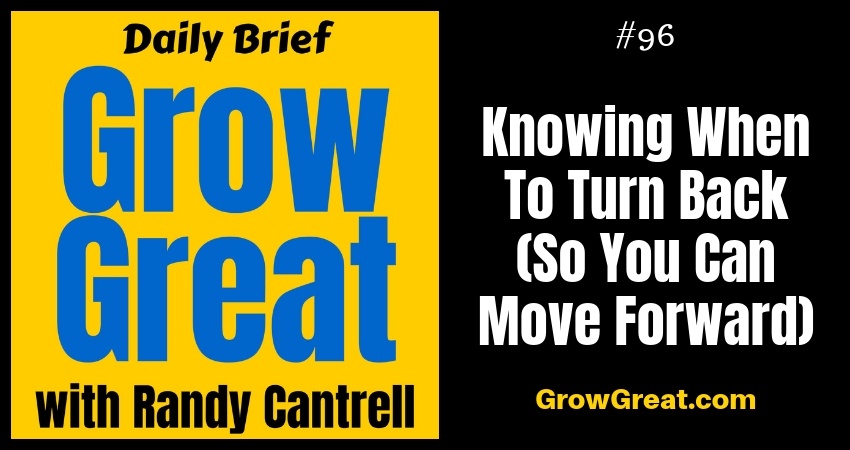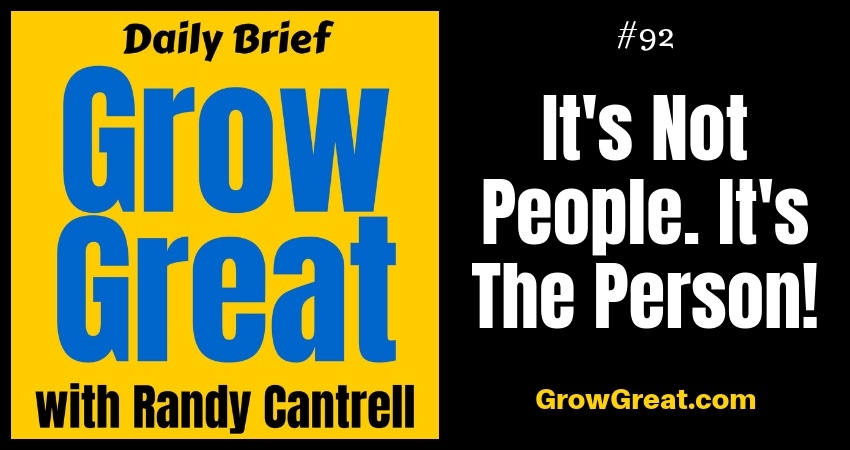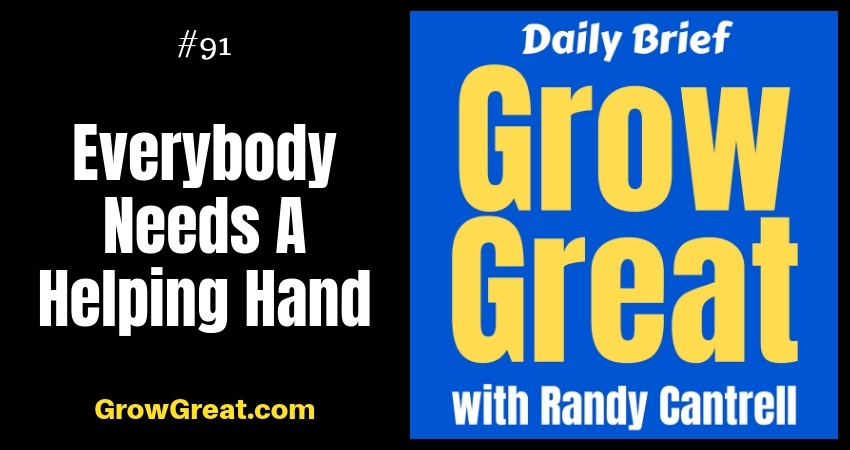Knowing When To Turn Back (So You Can Move Forward) – Grow Great Daily Brief #96 – November 2, 2018
Podcast: Play in new window | Download (Duration: 12:03 — 11.5MB)
Subscribe: Apple Podcasts | Spotify | RSS | More

One step forward, two steps back. A better strategy is one step back, two steps forward. But that’s not how the cliché goes. I think we should change it.
Take a step back so you can move forward further, faster!
I’m not talking about regressing. Not far from where I live there are two sweet tree-lined streets that are heavily traveled. But there’s a problem. When it rains a lot, the roads flood because they’re in very low lying areas. Yellow signal lights are activated by the city then gates are pulled together to keep cars from going any further. Those of us who live in the area know when it rains a lot we’d better figure out some other route. Sometimes I forget, only to get to the warning light and have to turn around and go back. It’s the only path forward.
What do you do when life doesn’t present you with a yellow flashing warning light though? How do you know it’s time to turn back?
Sometimes you don’t. That’s why we dig ourselves into a hole and we keep digging. We’re unaware that what we’re doing isn’t working, or likely to ever work. Before we can ever advance we have to stop hurting ourselves from moving forward. Rule one: stop moving backward. The paradox is that the path forward begins by seeing we’re already moving backward…but now we have to move back even further. That’s when resistance kicks in. Our brain and our desires compel us to not do it.
Seeing the reality of our current actions isn’t always easy. We feel like this digging (hustling, grinding – pick the term you love most) is moving forward. No, we’re not seeing signs of success, but how are we to know we’re mere days away from breaking through? We all think about it and talk about not quitting too soon. So we keep digging. Thinking it’s the wise option.
What if we’re wrong?
I was watching one of those HGTV flip shows late one night. You know the shows. Couples in various markets in the country buy homes, rehab them, update them and flip them for a profit. Every episode is pretty much the same. Buy the house as inexpensively as possible. Sink as little into as necessary, or as much as necessary, depending on the market and comparable prices in the area. Sometimes they encounter a problem though. Suddenly they need to sink in another $2,500. Then they encounter a problem that has to be fixed, like electrical or mold. There goes another $3,000. Suddenly, the flippers realize their math isn’t going to work if they don’t stop investing more money into the property. Sometimes they guess right. Sometimes not. Of course, on TV they always get it right. We don’t see the downsides of the flipping business. Those times you invest more than you make back. Watch just a few episodes and you quickly realize it’s a game of cost containment and market conditions.
Look at your life in the same way. Cost containment versus market conditions. Can I invest more time and money and make a return on the investment? Well, I think I can. But even these seasoned flippers often get it wrong. They buy a house for $108,000, sink another $60,000 into it thinking they can sell it for $225,000. So they enter the game expecting to earn a gross profit of $57,000. Once the rehab begins they find problems they didn’t budget for. Electrical. Structural. Plumbing. Mold. Now they’ve sunk an additional $20,000 into their costs. That $57,000 expected return is now $37,000. And once they list it, expecting to sell it for $225,000 and quickly. But two weeks on the market the only offer they get is for $212,000. They don’t make $57,000. Instead, they make $24,000. Life doesn’t always go as expected.
The lesson? We all have to adapt. Knowledge and speed are critical.
The more flippers know about the project the better. Those hidden problems are the costly ones. And the speed with which they can do the work, and how quickly they can sell the property — those are major elements of their success.
It’s the same with our lives. Personally and professionally.
Knowledge. Speed. Key ingredients for our success, growth, improvement and transformation.
The quicker we know we’re stuck, the better. It all begins with understanding things as they truly are so we don’t delude ourselves. Flippers can be delusional about how much return they’ll get on a specific investment. Will those hardwood floors warrant a significantly higher selling price? They may feel very strongly, “Yes.” But they may be wrong. It could be an expensive mistake.
I live and have grown up in oil field country. My grandfather was a wildcatter. Guys who drilled oil wells on speculation, hoping to strike oil. The challenge for wildcatters is, “How deep do you drill before you give up?” All my life I’ve heard the saying, “Don’t keep drilling a dry hole.” Make sense, right? Don’t keep spending money and time to drill a hole that will never produce results.
That’s great except it doesn’t address how you can know to stop drilling. It’s the same challenge we all have. We don’t start drilling or rehabing a house (if we’re a flipper) thinking failure. We’re fixated on the success we see in our mind. It can be hard to let go of that belief. Especially if we’re already heavily invested in money and time. Every seasoned negotiator knows the benefit. The more time you make the other person invest time in the process the more likely they’re going to want to make a deal. Nobody wants to walk away from a deal after we’ve spent so much time trying to make it happen. Is it reasonable? Who says we have to behave reasonably?
How can we protect ourselves? How can we see clearly that it’s time to stop and turn back…otherwise, we’ll never be able to move forward?
Outside perspective. That’s how. The elimination of our blind spots and the reduction of our false assumptions can happen effectively when we surround ourselves with people who care enough about us, and our success, to help us figure it out. We don’t need – or want – people to take control of our lives. We still want to be in charge of our own destiny. We just need safe, caring people capable of asking us tough questions, challenging our assumptions, pushing us…all in a non-judgmental way.
The answer is to surround yourself with people willing and able to serve you. People who have no vested interest in your outcome except to see you achieve the goals you’ve established for yourself. Now you can see THE PEER ADVANTAGE. The advantage of having people in your life who will do that for you.
Convenience is speed. Online and virtual make it powerful.
The power of THE PEER ADVANTAGE is why I’m now building two groups of U.S. based entrepreneurs bold enough, hungry enough, hard-charging enough to do that for themselves. I want to invite you to take some time to check out the details at ThePeerAdvantage.com 0r you can jump start things by filling out the application form at BulaNetwork.com/apply. Your application doesn’t put any pressure on you or me, but it gives us a starting point for a phone call. Apply right now.
Be well. Do good. Grow great!








